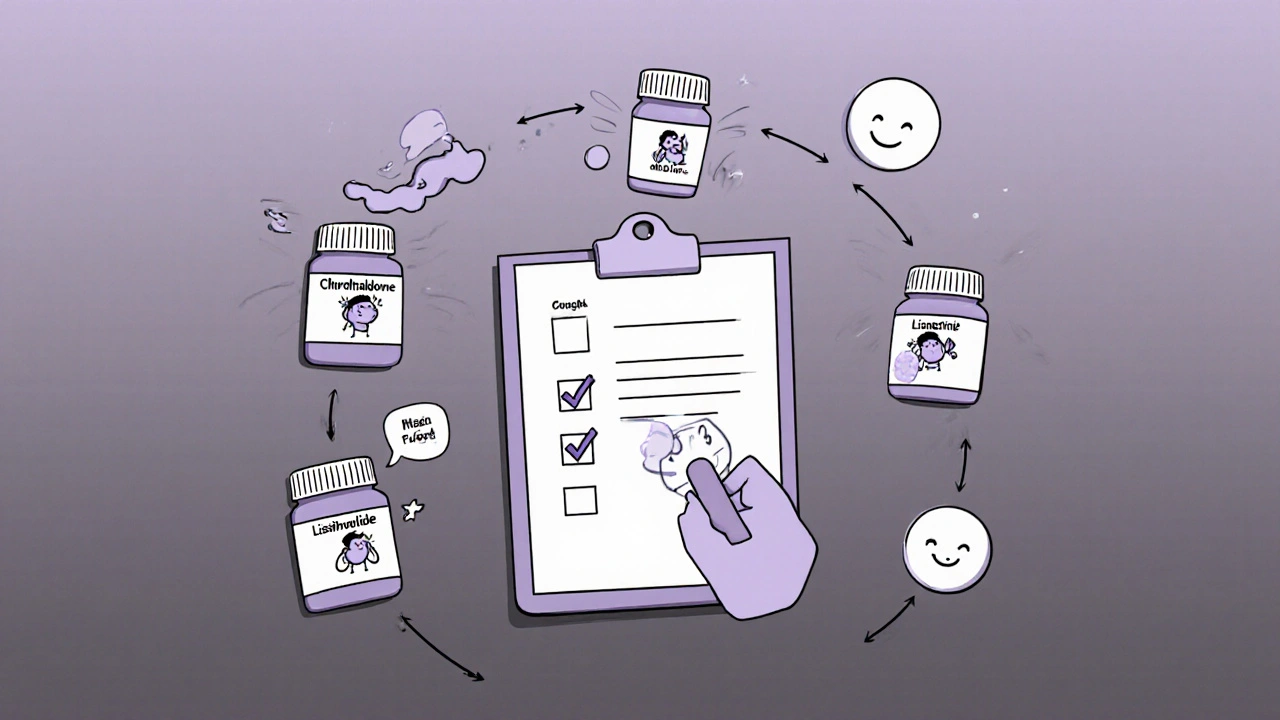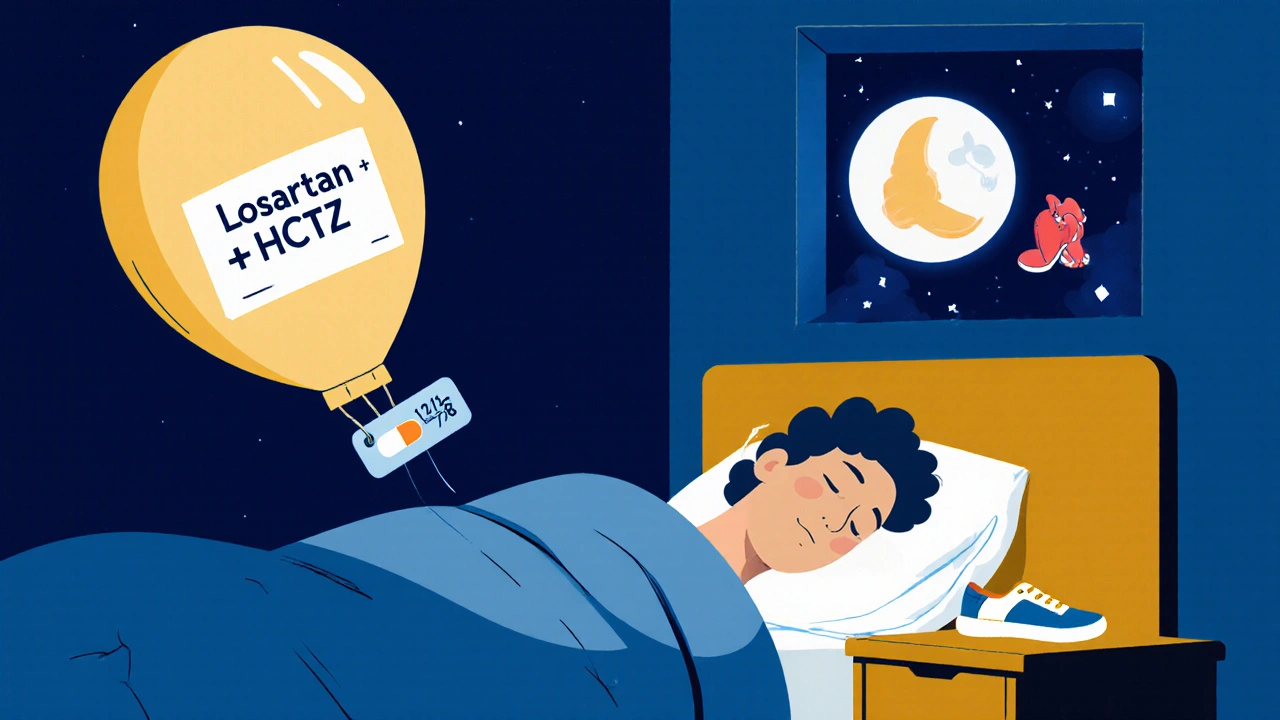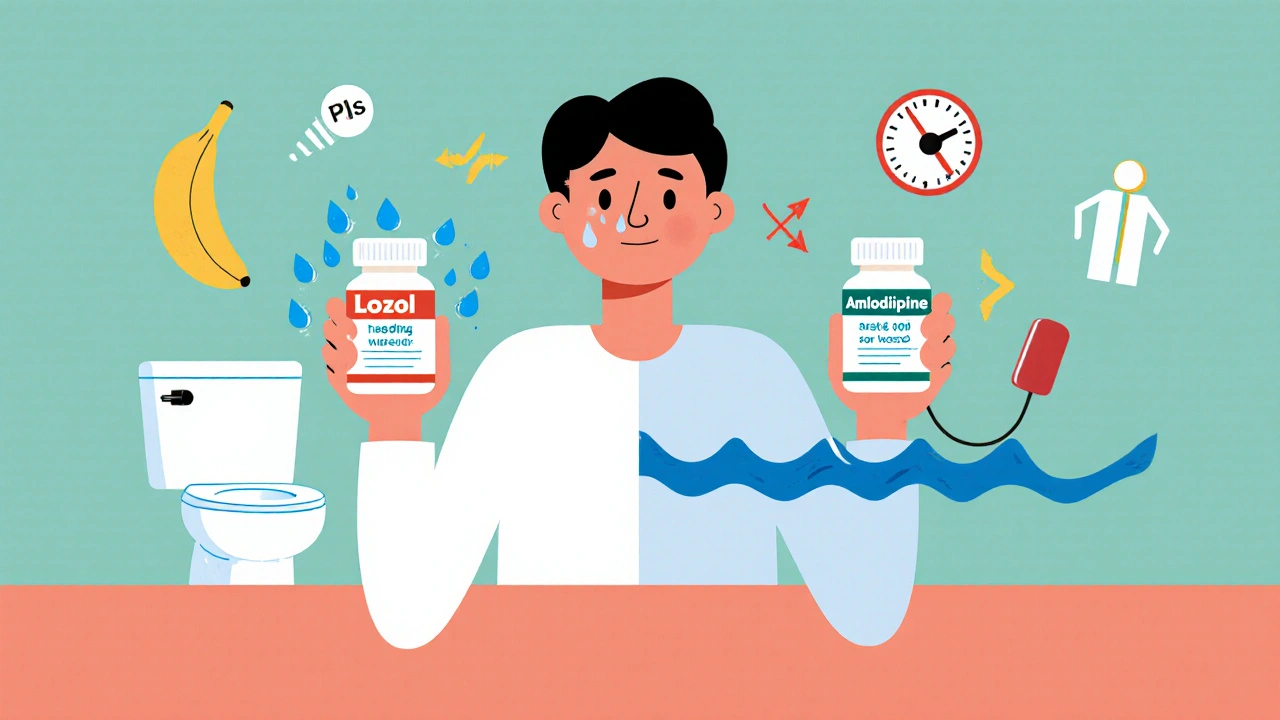High Blood Pressure Medication Recommender
Find Your Best Blood Pressure Alternative
This tool helps you identify the most suitable blood pressure medication alternative based on your specific health conditions, symptoms, and preferences. Input your details below to get personalized recommendations.
Recommended Alternatives
If you’re taking Lozol (indapamide) for high blood pressure, you’ve probably wondered if there’s a better option. Maybe your blood pressure isn’t quite under control. Maybe you’re dealing with side effects like frequent urination, dizziness, or low potassium. Or maybe your insurance just raised the price. You’re not alone. Many people on indapamide look for alternatives-and for good reason. Not all diuretics are the same, and what works for one person might not work for another.
What is Lozol (Indapamide)?
Lozol is the brand name for indapamide, a thiazide-like diuretic approved by the FDA in the 1980s. It’s primarily used to treat high blood pressure (hypertension), and sometimes fluid retention from heart failure. Unlike older diuretics like hydrochlorothiazide, indapamide doesn’t just flush out salt and water-it also relaxes blood vessel walls, helping lower pressure more directly.
Standard doses range from 1.25 mg to 2.5 mg once daily. It’s often prescribed as a first-line treatment because it’s effective, taken once a day, and has fewer side effects than older diuretics. But it’s not perfect. Studies show about 15-20% of people experience mild side effects like muscle cramps, dry mouth, or low sodium levels. And while it’s generally safe, it’s not always the best fit for everyone.
Common Alternatives to Lozol
There are several other medications used to treat high blood pressure that can replace or work alongside indapamide. Here are the most common ones, based on clinical guidelines from the American Heart Association and the European Society of Hypertension.
Hydrochlorothiazide (HCTZ)
This is the most common alternative. Hydrochlorothiazide is a classic thiazide diuretic, cheaper than indapamide, and available as a generic. It’s been used for over 60 years. But here’s the catch: studies comparing the two show indapamide lowers systolic blood pressure slightly better-by about 3-5 mmHg on average-over 12 weeks. HCTZ also tends to cause more potassium loss, which means more people need potassium supplements or blood tests to monitor levels.
Chlorthalidone
Chlorthalidone is another thiazide-like diuretic, but it lasts longer in the body. It’s often used in research studies because it’s more effective at reducing cardiovascular events than HCTZ. A 2018 analysis of over 100,000 patients found chlorthalidone reduced heart attacks and strokes more than HCTZ. It’s not as widely prescribed as HCTZ, but doctors in the U.S. and Europe are starting to recommend it as a better long-term option. The downside? It can cause more electrolyte imbalances, especially in older adults or people with kidney issues.
Amiloride
Amiloride is a potassium-sparing diuretic. Unlike Lozol, it doesn’t drain potassium-it actually helps keep it in. That makes it useful for people who get muscle cramps or fatigue from other diuretics. But it’s not strong enough on its own to control high blood pressure. It’s usually combined with HCTZ or indapamide in pills like Moduretic. If you’re on Lozol and your potassium keeps dropping, your doctor might switch you to a combo pill with amiloride instead.
Lisinopril (ACE Inhibitor)
Lisinopril belongs to a different class of drugs called ACE inhibitors. It works by relaxing blood vessels and reducing stress on the heart. It’s often used in people with diabetes, kidney disease, or heart failure. Compared to indapamide, lisinopril doesn’t cause frequent urination or electrolyte loss. But it can cause a dry, annoying cough in up to 20% of users. If you’ve had a cough after starting a new blood pressure pill, this might be why.
Losartan (ARB)
Losartan is an angiotensin II receptor blocker (ARB). It’s similar to lisinopril but doesn’t cause coughing. It’s often prescribed as an alternative for people who can’t tolerate ACE inhibitors. Losartan is especially helpful for people with kidney problems due to diabetes. It’s also less likely to cause low sodium or potassium than diuretics. But it’s more expensive, and some people report dizziness or fatigue.
Calcium Channel Blockers: Amlodipine
Amlodipine is one of the most prescribed blood pressure meds in the world. It works by relaxing arteries, reducing pressure without affecting electrolytes. It’s often combined with diuretics for better results. Unlike indapamide, it doesn’t make you pee more. That’s a big plus for people who hate nighttime bathroom trips. Side effects? Swollen ankles, flushing, or headaches-especially when starting. But it’s very well tolerated long-term.
Comparison Table: Lozol vs. Alternatives
| Medication | Class | Dose | Key Benefits | Common Side Effects | Best For |
|---|---|---|---|---|---|
| Lozol (Indapamide) | Thiazide-like diuretic | 1.25-2.5 mg once daily | Reduces blood pressure + relaxes vessels; once-daily dosing | Low potassium, dizziness, frequent urination | People needing strong diuretic effect without multiple doses |
| Hydrochlorothiazide (HCTZ) | Thiazide diuretic | 12.5-50 mg once daily | Cheap, widely available, well-studied | Low potassium, dehydration, high blood sugar | Cost-sensitive patients; mild hypertension |
| Chlorthalidone | Thiazide-like diuretic | 12.5-25 mg once daily | Longer action; better at preventing heart events | Electrolyte imbalance, fatigue, low sodium | Long-term risk reduction; older adults |
| Amiloride | Potassium-sparing diuretic | 5-10 mg once daily | Keeps potassium high; often combined | High potassium, dizziness, nausea | People with low potassium on other diuretics |
| Lisinopril | ACE inhibitor | 5-40 mg once daily | Protects kidneys; good for diabetics | Dry cough, dizziness, high potassium | Diabetes, kidney disease, heart failure |
| Losartan | ARB | 25-100 mg once daily | No cough; kidney protection | Dizziness, fatigue, high potassium | People who can’t take ACE inhibitors |
| Amlodipine | Calcium channel blocker | 2.5-10 mg once daily | No electrolyte loss; no frequent urination | Ankle swelling, flushing, headaches | People who hate peeing all night |

When to Switch from Lozol
You don’t need to switch just because you can. But here are clear signs your doctor might suggest a change:
- Your blood pressure stays above 130/80 despite taking Lozol
- You’re constantly dehydrated or dizzy when standing up
- Your potassium levels drop below 3.5 mEq/L on blood tests
- You’re waking up 3+ times a night to pee
- Your insurance no longer covers it, and the cash price is over $50/month
- You’re on multiple meds and want to simplify your routine
If any of these sound familiar, talk to your doctor. Don’t stop Lozol on your own. Stopping suddenly can cause your blood pressure to spike.
Combination Pills: A Simpler Option
Many people end up on two or more blood pressure meds. Instead of taking three separate pills, combination drugs can help. Examples:
- Lozol + Lisinopril (sold as Lozol-HCTZ in some countries)
- Amlodipine + Hydrochlorothiazide (Caduet, Exforge HCT)
- Losartan + HCTZ (Hyzaar)
These combos can lower blood pressure faster and reduce side effects. For example, combining a diuretic with an ARB like losartan reduces the risk of low potassium while improving overall control. If you’re on Lozol and still struggling, ask if a combo pill might be right for you.

What About Natural Alternatives?
Some people look to diet, supplements, or lifestyle changes to replace meds. While these help, they don’t replace prescription drugs for moderate to severe hypertension.
Things that can support blood pressure control:
- Reducing sodium to under 1,500 mg/day
- Getting 30 minutes of walking daily
- Increasing potassium-rich foods (bananas, spinach, sweet potatoes)
- Losing 5-10% of body weight if overweight
- Limiting alcohol to one drink a day
Supplements like magnesium, coenzyme Q10, or hibiscus tea may help slightly-but none have been proven to match the effect of indapamide. Don’t stop your pill because you started drinking hibiscus tea.
What’s the Best Alternative?
There’s no single answer. The best alternative depends on your health history, other conditions, and what side effects you can tolerate.
- If you’re young and healthy with mild hypertension → HCTZ (cheaper, effective)
- If you have diabetes or kidney disease → Lisinopril or Losartan
- If you hate peeing at night → Amlodipine
- If your potassium keeps dropping → Chlorthalidone or Amiloride combo
- If you want the strongest long-term protection → Chlorthalidone
Indapamide (Lozol) is still a solid choice. But if it’s not working for you, there are better options. The key is matching the drug to your body-not just your blood pressure number.
What to Do Next
If you’re thinking about switching:
- Write down your symptoms: What’s bothering you about Lozol?
- Check your last blood test results: Are your potassium, sodium, or kidney numbers normal?
- Ask your doctor: "Is there a better alternative based on my health?"
- Ask about cost: "Is there a generic version that’s cheaper?"
- Don’t rush: Switching meds takes 2-4 weeks to see full effect.
High blood pressure is a long-term condition. The right medication can help you live longer, avoid strokes, and feel better every day. Don’t settle for a pill that makes you feel worse. Work with your doctor to find what fits your life.
Can I switch from Lozol to a cheaper generic?
Yes. Indapamide is available as a generic, often costing under $5 a month. Some pharmacies even offer it for $4 on their discount lists. Check with your pharmacist-many generics are just as effective as the brand-name Lozol.
Does indapamide cause weight gain?
No. Unlike some blood pressure meds like beta-blockers or certain calcium channel blockers, indapamide doesn’t cause weight gain. In fact, it often leads to a small, temporary weight loss due to water loss. But this isn’t fat loss-it’s just fluid.
Is it safe to take indapamide with diabetes?
It can be, but it requires monitoring. Indapamide may slightly raise blood sugar levels in some people with diabetes. Your doctor may prefer an ACE inhibitor or ARB like lisinopril or losartan instead, because those protect the kidneys and don’t affect glucose as much.
How long does it take for blood pressure to drop on indapamide?
You may see a drop in blood pressure within 1-2 weeks, but it can take up to 6 weeks for the full effect. Don’t stop or change your dose if you don’t see immediate results. Consistency matters more than speed.
Can I take indapamide with alcohol?
Moderate alcohol is okay, but avoid heavy drinking. Alcohol can lower blood pressure too, and combining it with indapamide might make you dizzy or faint. Stick to one drink a day, and never drink on an empty stomach.
What happens if I miss a dose of Lozol?
If you miss a dose, take it as soon as you remember-if it’s still early in the day. If it’s after noon, skip it and take your next dose the next day. Don’t double up. Missing one dose won’t cause a spike, but regularly skipping doses can make your blood pressure harder to control.

Comments (11)